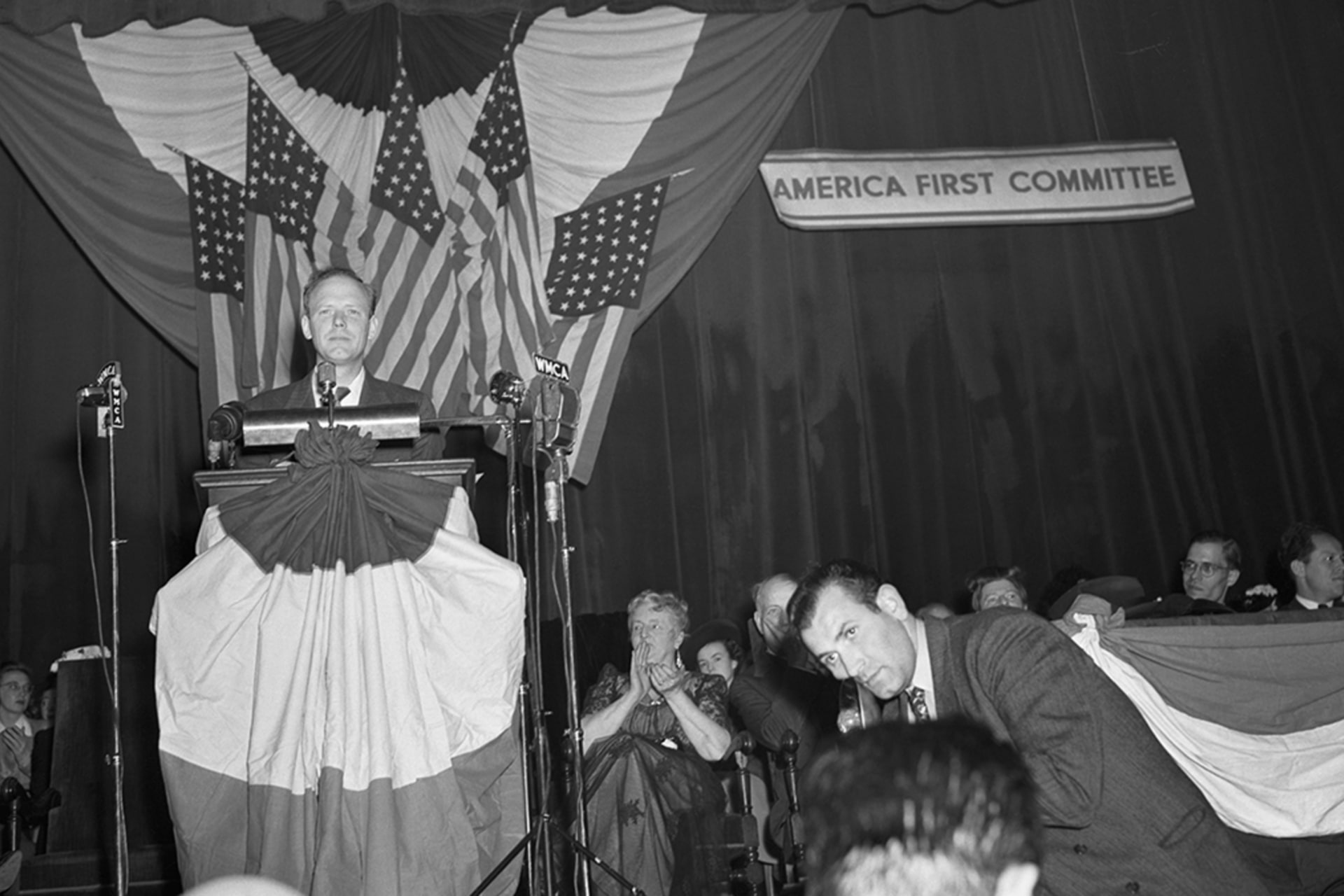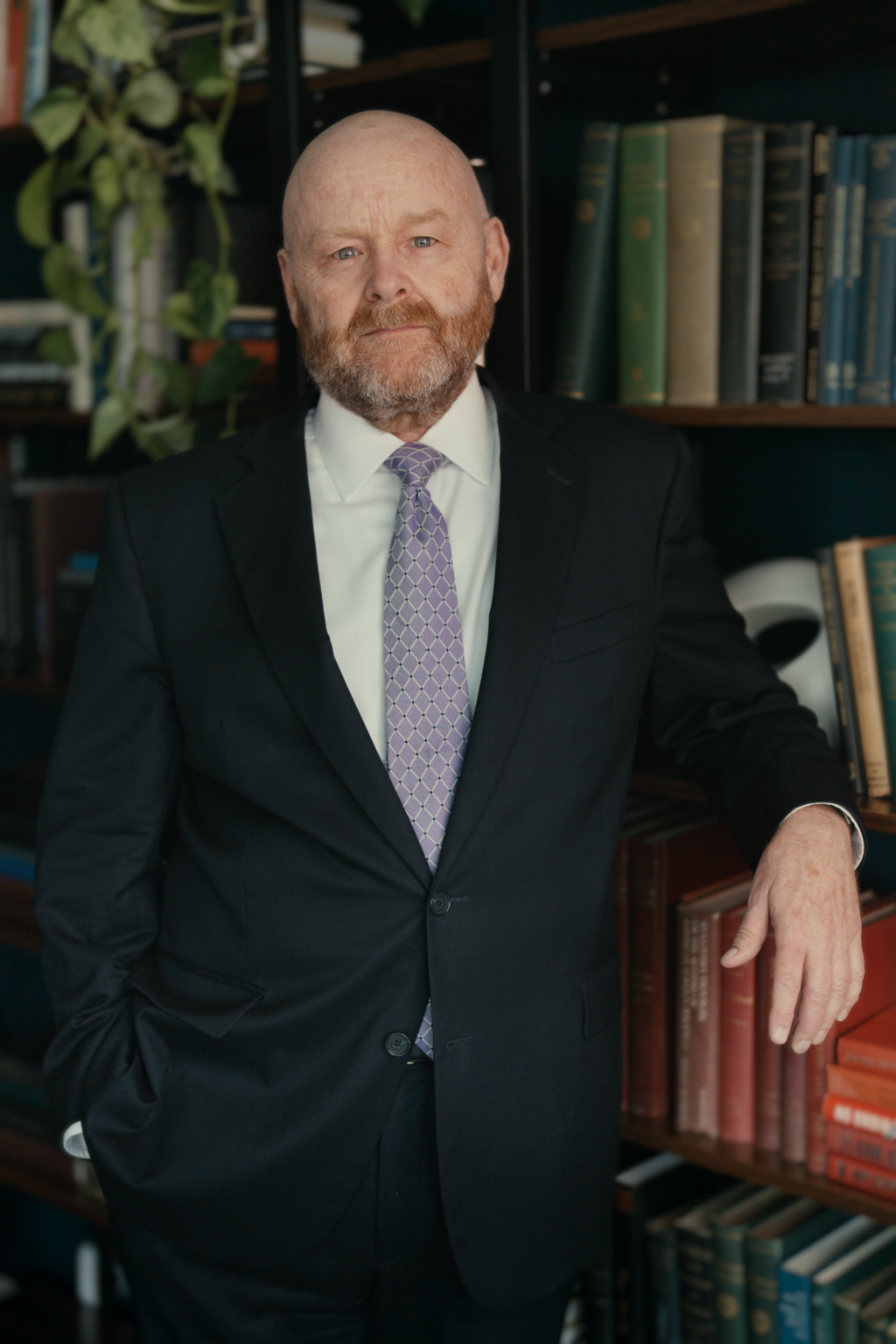TWE Remembers: Charles Lindbergh’s Des Moines Speech

By experts and staff
- Published
Experts
![]() By James M. LindsayMary and David Boies Distinguished Senior Fellow in U.S. Foreign Policy
By James M. LindsayMary and David Boies Distinguished Senior Fellow in U.S. Foreign Policy
September 11 is a black day in American history. But six decades before the planes flew into the Twin Towers and the Pentagon and crashed in a field in central Pennsylvania, it stood out as a shameful day. September 11, 1941 witnessed one of the vilest foreign policy speeches ever given by a prominent American: Col. Charles Lindbergh’s Des Moines Speech.
Charles Lindbergh may be a trivia question today, someone best remembered for the kidnapping and murdering of his baby son in 1932. But in 1941 he was among America’s greatest heroes, having been the first person to fly solo across the Atlantic. He certainly was the face of the noninterventionist movement in the United States on the eve of World War II. As Wayne Cole, a leading historian on the topic, wrote, “no other noninterventionist speaker aroused such enthusiastic support” as Lindbergh. Indeed, General Robert E. Wood, the chairman of the America First Committee, repeatedly sought to persuade him to take over the committee’s leadership precisely because of his unmatched fame.
Not everyone loved Lindbergh, however. In 1938, he accepted a medal from Hermann Göring, the head of Nazi Germany’s Luftwaffe, in honor of his transatlantic flight. Several weeks later, the Nazis launched Kristallnacht (“Night of Broken Glass”), a pogrom against Jews in Germany, Austria, and Sudetenland. Lindbergh dismissed calls that he return his medal in protest, saying “It seems to me that the returning of decorations, which were given in times of peace and as a gesture of friendship, can have no constructive effect.” His subsequent campaign to keep the United States out of the war in Europe after Germany invaded Poland in September 1939, coupled with his frequent praise for the German military, prompted charges that he either hoped for a Nazi victory or doubted America’s ability to stand up to a foreign threat. Indeed, by the time he arrived in Des Moines in September 1941, he had become accustomed to being denounced as a “coward,” “a Nazi,” and a “peripatetic appeaser.”
In his speeches during the first two years after Poland fell, Lindbergh had implied that “powerful elements” were pushing the United States into war. But he had always stopped short of saying who he thought those elements were. As he took the stage before 8,000 Iowans in the Des Moines Coliseum in September 1941, however, he wanted to name names. Calling his speech “Who Are the War Agitators?,” Lindbergh claimed that “The three most important groups who have been pressing this country toward war are the British, the Jewish and the Roosevelt administration.” He went on to analyze what he saw as each group’s motives, saying of “the Jewish” in particular:
It is not difficult to understand why Jewish people desire the overthrow of Nazi Germany. The persecution they suffered in Germany would be sufficient to make bitter enemies of any race.
No person with a sense of the dignity of mankind can condone the persecution of the Jewish race in Germany. But no person of honesty and vision can look on their pro-war policy here today without seeing the dangers involved in such a policy both for us and for them. Instead of agitating for war, the Jewish groups in this country should be opposing it in every possible way for they will be among the first to feel its consequences.
Tolerance is a virtue that depends upon peace and strength. History shows that it cannot survive war and devastation. A few far-sighted Jewish people realize this and stand opposed to intervention. But the majority still do not.
Their greatest danger to this country lies in their large ownership and influence in our motion pictures, our press, our radio and our government.“
Lindbergh’s speech came under fire almost immediately from newspapers and politicians across the political spectrum. The Des Moines Register denounced it as “so intemperate, so unfair, so dangerous in its implications that it cannot but turn many spadefuls in the digging of the grave of his influence in this country.” The Hearst papers, normally sympathetic to the noninterventionist cause, called “the assertion that the Jews are pressing this country into war is UNWISE, UNPATRIOTIC, and UN-AMERICAN.” Wendell Willkie, the GOP presidential candidate in 1940, called it “the most un-American talk made in my time by any person of national reputation.” The Texas House of Representatives passed a resolution saying that Lindbergh was not welcome to speak in the state. FDR said nothing about Lindbergh, whom he detested. But the White House press secretary left no doubt about what the president thought, noting a “striking similarity” between what Lindbergh said and “the outpourings of Berlin in the last few days.”
Lindbergh couldn’t have been surprised by the reaction to his speech. His wife, Anne Morrow Lindbergh, had read the speech in draft and begged him not to blame Jews for the country’s drift toward war. She feared that the remarks would inflame religious hatred, and she knew people would conclude that Lindbergh was an anti-Semite. She told him, “I would prefer to see this country at war than shaken by violent anti-Semitism.”
Lindbergh was no more deterred by the outpouring of public criticism of his Des Moines speech than he had been by his wife’s private criticism. He believed he hadn’t done anything wrong. He wrote in his diary:
My Des Moines address has caused so much controversy, that General Wood has decided to hold a meeting of the America First national Committee in Chicago. I must, of course, attend. I felt I had worded my Des Moines address carefully and moderately. It seems that almost anything can be discussed today in America except the Jewish problem. The very mention of the word “Jew” is cause for a storm. Personally, I feel that the only hope for a moderate solution lies in an open and frank discussion.
The leaders of the America First Committee debated whether to distance themselves and the organization from Lindbergh’s speech at that hastily called meeting in late September. They ultimately decided not to repudiate either him or his remarks. Their reasoning? In their view, much of what Lindbergh had said was true—most Jewish Americans favored intervention. As much as the committee’s leadership insisted that this sort of thinking did not constitute anti-Semitism, the committee’s decision only encouraged the anti-Semitic forces in the movement.
The controversy that Lindbergh’s Des Moines speech sparked justifiably damaged his reputation and set back the noninterventionist cause. The America First Committee’s efforts to block the Roosevelt Administration’s efforts to repeal legislation limiting aid to Great Britain sputtered, as the organization found itself on the defensive trying to justify or explain away Lindbergh’s remarks.
Within three months, the question of war would be moot. In the wake of Pearl Harbor, Lindbergh sought to be recommissioned as an officer of U.S. Army Air Force, but the War Department turned him down at the White House’s direction. He ended up working in the Pacific theater as a civilian technical adviser to plane manufacturers, eventually flying dozens of combat missions. After the war, he enjoyed a rehabilitation of sorts as President Dwight D. Eisenhower restored his commission and made him a Brigadier General. But he would never again be a significant voice in American political life.
